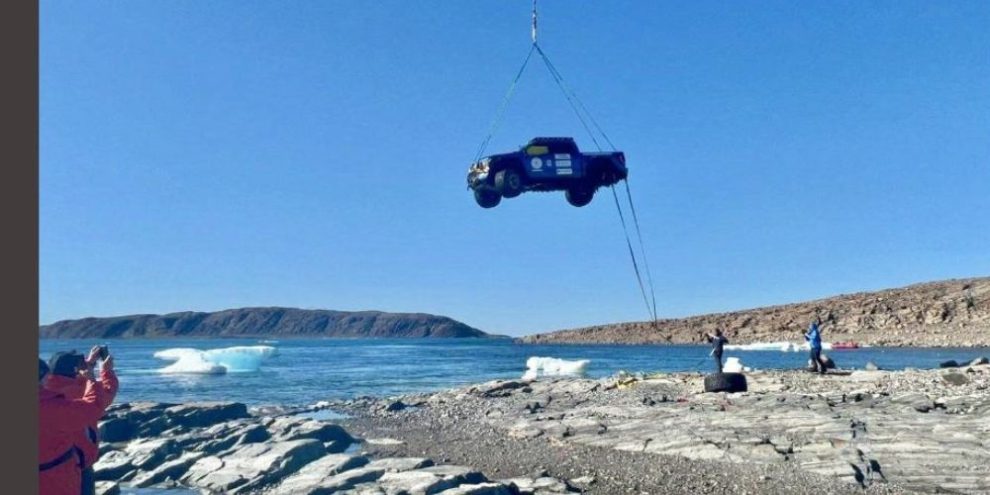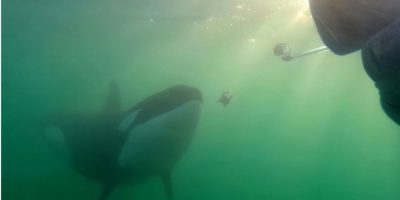
Gjoa Haven
An international team has recovered a submerged truck from remote Arctic waters using divers, airbags and a helicopter.
The long-planned recovery mission of the Ford-150, which fell through the ice near the Tasmania Islands in Nunavut five months ago, took place over three days. Specialized divers from Iceland attached airbags to the truck and towed it to shore, where it was airlifted by helicopter to Gjoa Haven, Nvt., about 300 kilometres away, on Sunday.
Team member Andrew Comrie-Picard — a professional driver, X Games medallist, stuntman and TV host and producer who grew up in Edmonton — called the recovery a "tremendous success."
“Once the helicopter went over the horizon and took the truck and we could once again hear that dripping of the water off the ice floes going by and the birds and then otherwise the silence, it made me kind of emotional that we were at least able to clean the land and leave it the way that we found it," he said in an interview from Gjoa Haven on Monday night.
Comrie-Picard said the strong current and the depth to which the truck sunk made the mission especially challenging. He said that at one point, the diver had to swim about seven metres against a current that was about six to eight km/h.
"We could hear him on the radio breathing, working so hard," Comrie-Picard said. "That poor guy is shattered now, just exhausted.”
After the truck was airlifted, Comrie-Picard said he spent another night on the island to make sure the area was cleaned. Local hunters who helped with the effort showed him where historical Inuit camps, meat stores and fish lines were located.
“It was actually kind of powerful to be on the land as people had previously been on the land," he said.
He added that it was a "great privilege" to develop connections with Inuit and gain a better cultural understanding of the area.
The sunken truck was part of the TransGlobal Car Expedition, where a team of 16 people from Canada, Russia, Ukraine, the United States and Iceland completed a 2,200-kilometre journey from Yellowknife to Resolute, Nvt., in March.
The expedition team said it was the world's first overland wheeled crossing from the continental shelf of Canada to the High Arctic. It was also a pre-run of a section of a longer overland journey to circumnavigate the planet planned to take place in 2023-2024.
The expedition made international headlines when a plane with two Russian team members was grounded in Yellowknife. Canada had closed its airspace to Russian-owned or operated aircraft in February due to Russia’s attack on Ukraine.
Two pilots and the Russian who chartered the plane were each fined $3,000, while the Geneva-based aircraft operator was fined $15,000 for violating Canadian aviation regulations.
The truck fell through the ice during a return trip to Cambridge Bay, Nvt., on March 23. Comrie-Picard, who was in Resolute at the time, said the two people inside were able to escape through the passenger-side door.
They were unharmed, but left in their stocking feet in the frigid cold. He said it was a "traumatic and challenging night" as team members waited until daylight in another truck.
Comrie-Picard said because of the current, the ice where the truck broke through had thinned to 15 centimetres thick from 60 centimetres five days earlier when the team initially travelled over the area.
The truck, which Comrie-Picard said is now "just scrap metal," will head to Montreal on the next available sealift.
Banner image: A helicopter airlifts a Ford F-150 into the air to transport it from near the Tasmania Islands to Gjoa Haven, Nvt., in a handout photo. An international team has completed the massive operation to recover the truck from remote Arctic waters. THE CANADIAN PRESS/HO-TransGlobal Car Expedition
This report by The Canadian Press was first published Aug. 31, 2022.
— By Emily Blake in Yellowknife






